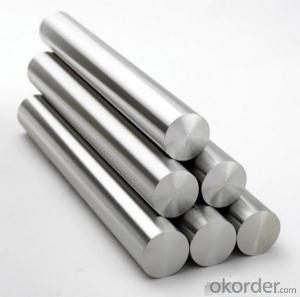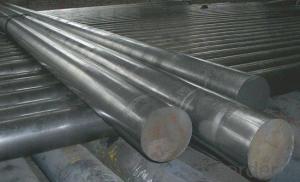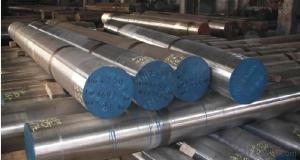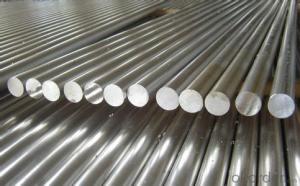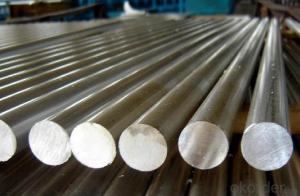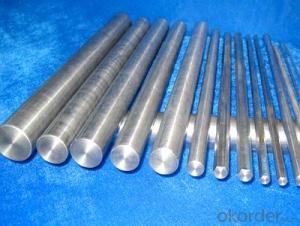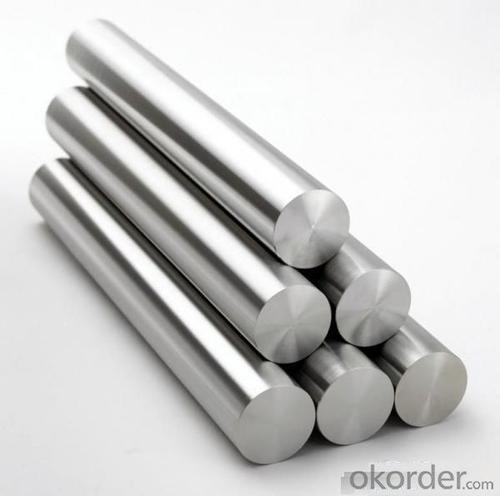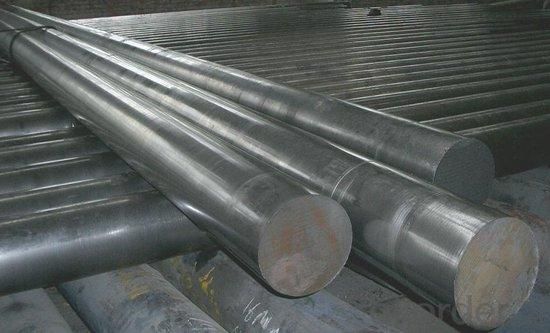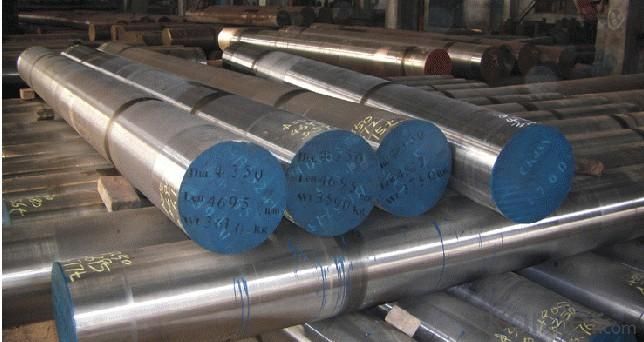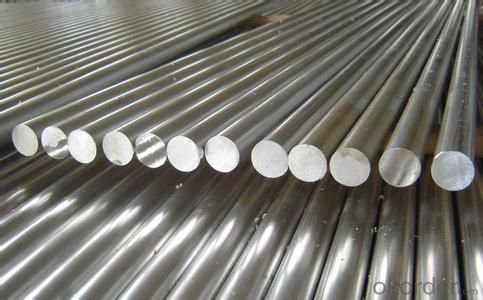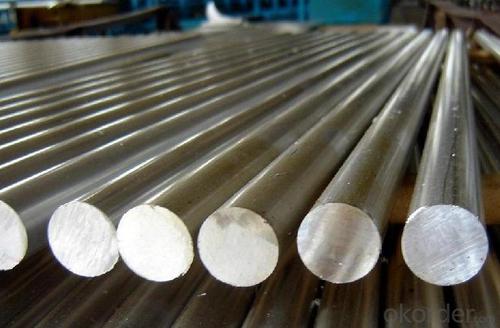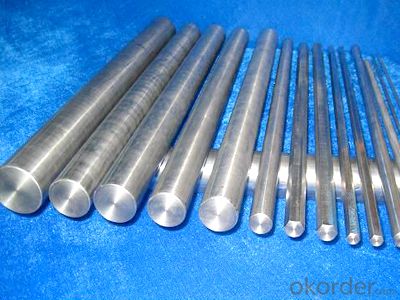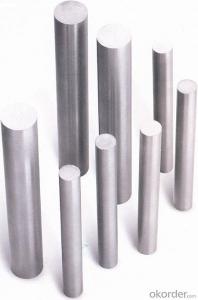Grade 201 Stainless Steel Round Bar Large Quantity in Stock
- Loading Port:
- Tianjin
- Payment Terms:
- TT OR LC
- Min Order Qty:
- 1 m.t.
- Supply Capability:
- 10000 m.t./month
OKorder Service Pledge
OKorder Financial Service
You Might Also Like
Specification
Grade 201 Stainless Steel Round Bar in stock
Descriptio of Grade 201 Steel Round Bar in Stock
(stainless steel round bar, angle bar , flat bar , channel bar , hexagon bar , square bar .)
1.grade:201,202,301,302,303,304,304L,308,309,310,310S,316,316L,321,410,420,430,etc.
2.diameter:3mm-400mm.
3.surface:bright , black , pickeled & bright .
4.length: no more than 6 m .
5.packing: according to international standards of export .
6.trade terms: FOBshanghai , CIF+import port .
7.payment terms: L/C at sight , 30% T/T in advance + copy of B/L .
8.delivery time: within 8 to 12 days since the receipt of payment .
9. MOQ is 1 ton .
Description of Grade 201 Steel Round Bar in Stock
Standard | AISI , JIS , ER , GB , ASTM , etc. |
| Grade | 201,201,301,302,303,304,304l,308,309,310,310S,316,316L,321,410,420,etc. |
| Application | widely used in the areas as ss fasteners , chains , kitchen and sanitary wares , furniture handles , handrails , electroplating and electrolyzing pendants , foods, electron , petroleum , construction and decoration , etc. with a high strength after cold-drawn , anti-stress corrosion , good surface . |
| Chemcial composition | according to international standards of ASTM , AISI , JIS , ER , GB ,etc. |
Company Information of Grade 201 Steel Round Bar in Stock
CNBM International Corporation is the most import and export platform of CNBM group(China National Building Material Group Corporation) ,which is a state-owned enterprise, ranked in 270th of Fortune Global 500 in 2015.
With its advantages, CNBM International are mainly concentrate on Cement, Glass, Iron and Steel, Ceramics industries and devotes herself for supplying high quality series of refractories as well as technical consultancies and logistics solution.
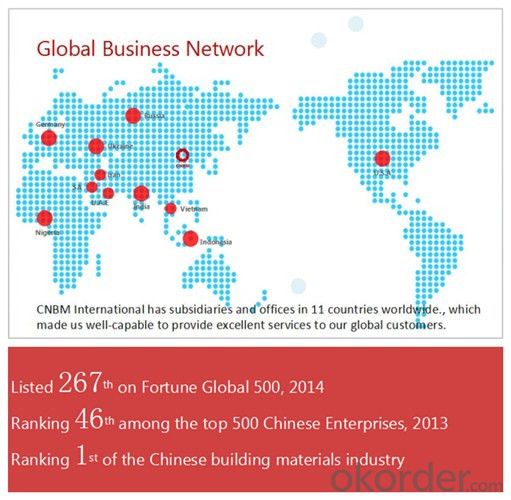
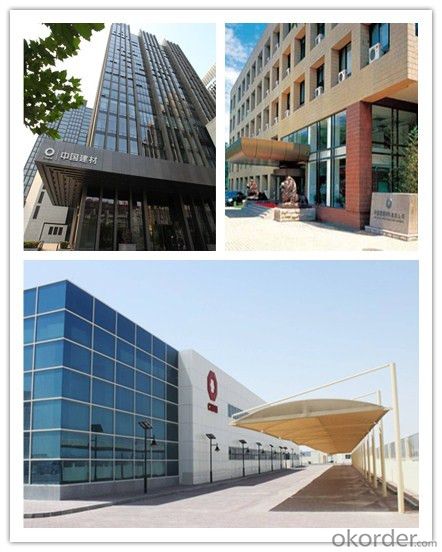
Packaging & Delivery of Grade 201Steel Round Bar in Stock
Packaging Detail | Sea worthy packing /as per customer's packing instruction |
Delivery Detail | 15 ~ 40 days after receiving the deposit |
Products Show
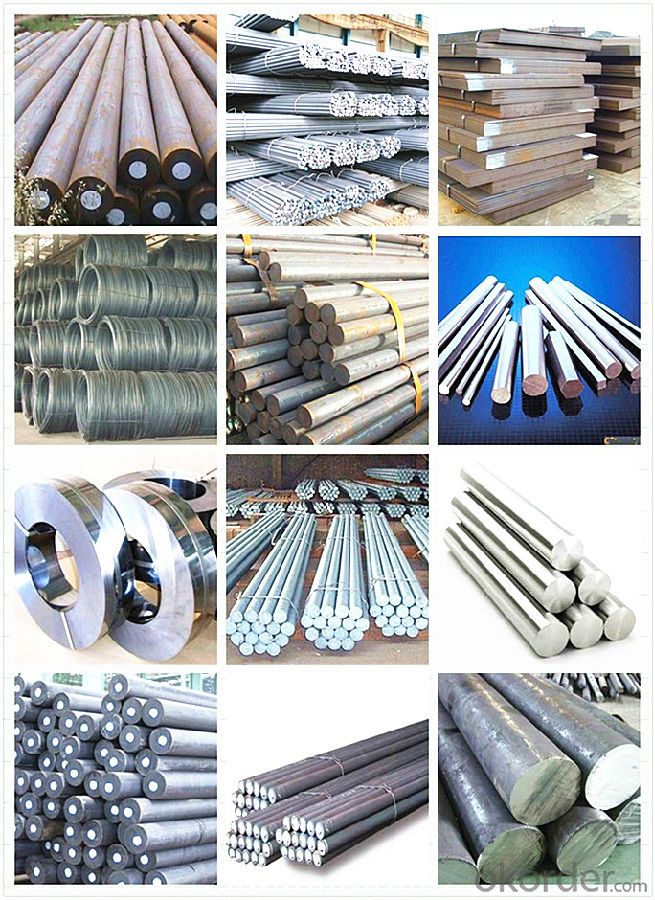
FAQ:
Are you a trading company or manufacturer? | Manufacturer |
What’s the MOQ? | 3 metric ton |
What’s your delivery time? | 15-35 days after downpayment received |
Do you Accept OEM service? | Yes |
what’s your delivery terms? | FOB/CFR/CIF |
What's the Payment Terms? | 30% as deposit,70% before shipment by T/T |
Western Union acceptable for small amount. | |
L/C acceptable for large amount. | |
Scrow ,Paybal,Alipay are also ok | |
Why choose us? | Chose happens because of quality, then price, We can give you both. Additionally, we can also offer professional products inquiry, products knowledge train (for agents), smooth goods delivery, excellent customer solution proposals. |
What's your available port of Shipment? | Main Port, China |
What’s your featured services? | Our service formula: good quality+ good price+ good service=customer's trust
|
Where are your Market? | Covering more than 160 countries in the world |
- Q: Can special steel be used in the nuclear power industry?
- Yes, special steel can be used in the nuclear power industry. Specialized steel alloys, such as stainless steel and low alloy steel, are commonly used in the construction of nuclear reactors and other components due to their high strength, corrosion resistance, and ability to withstand high temperatures and radiation. These materials are crucial for ensuring the safety and reliability of nuclear power plants.
- Q: What are the applications of special steel in the manufacturing sector?
- Special steel has a wide range of applications in the manufacturing sector, including the production of tools, machinery, automotive components, and construction materials. Its exceptional strength, durability, and resistance to corrosion make it ideal for manufacturing applications that require high performance and reliability. Furthermore, special steel can be tailored to specific requirements, enabling manufacturers to create customized products with enhanced properties, such as heat resistance or hardness. Overall, special steel plays a crucial role in various industries, contributing to the advancement and efficiency of the manufacturing sector.
- Q: How does special steel enhance the durability of products?
- Special steel enhances the durability of products by providing them with superior strength, hardness, and resistance to corrosion and wear. Its unique composition and manufacturing processes result in a material that can withstand high pressure, extreme temperatures, and harsh environments, making it ideal for applications where regular steel would fail. This enhanced durability ultimately leads to longer product lifespans, increased reliability, and reduced maintenance costs.
- Q: What are the different material selection factors for special steel?
- The selection of materials for special steel involves considering various factors to ensure the desired performance, durability, and cost-effectiveness of the final product. Some of the key material selection factors for special steel include: 1. Mechanical Properties: Special steel should possess the required mechanical properties to meet the specific application's demands. This includes factors like strength, hardness, toughness, fatigue resistance, and wear resistance. 2. Corrosion Resistance: Depending on the intended use, special steel may need to possess high corrosion resistance to withstand exposure to harsh environments, chemicals, or moisture. This factor ensures the longevity and reliability of the steel in its intended application. 3. Heat Resistance: Special steel may need to exhibit excellent heat resistance properties, particularly for applications involving high temperatures, such as in aerospace or power generation industries. The material should be able to retain its strength and structural integrity even at elevated temperatures. 4. Machinability: The ease with which special steel can be machined is an essential factor to consider, especially for applications involving complex shapes or precision components. High machinability allows for efficient manufacturing processes and reduces production costs. 5. Weldability: Special steel selected for applications that require joining through welding should possess good weldability. This ensures that the material can be easily welded without compromising its strength or introducing defects. 6. Cost: The cost of the material plays a significant role in material selection. Balancing the desired properties with the available budget is crucial to achieve the optimal cost-effectiveness of the final product. 7. Availability: The availability of the chosen special steel is also a vital consideration. Ensuring a reliable and consistent supply of the material is necessary to avoid production delays or interruptions. 8. Environmental Impact: The environmental impact of the material should be evaluated, considering factors such as energy consumption during production, recyclability, and the use of sustainable raw materials. Opting for eco-friendly materials aligns with sustainable practices and regulations. By carefully considering these material selection factors, engineers and designers can choose the most suitable special steel for their specific application, ensuring optimal performance, durability, and cost-efficiency.
- Q: How does spring steel maintain its elasticity?
- Spring steel maintains its elasticity due to its unique composition and manufacturing process. It is made from a specific type of high-carbon steel that undergoes a specialized heat treatment called quenching and tempering. This process involves heating the steel to a high temperature and then rapidly cooling it in water or oil, followed by reheating to a specific temperature and allowing it to cool slowly. This heat treatment creates a fine-grained microstructure in the steel, which gives it the ability to withstand repeated bending or twisting without permanently deforming. Additionally, the high carbon content in spring steel enhances its strength and resilience, allowing it to return to its original shape even after being subjected to significant force or pressure.
- Q: How does special steel contribute to reducing greenhouse gas emissions?
- Special steel can contribute to reducing greenhouse gas emissions in several ways. Firstly, special steel is often used in the construction of energy-efficient buildings and infrastructure, which helps to reduce the energy consumption and carbon emissions associated with heating, cooling, and transportation. Additionally, special steel can be utilized in the manufacturing of more lightweight vehicles and machinery, leading to improved fuel efficiency and lower emissions. Furthermore, special steel is also employed in renewable energy technologies such as wind turbines and solar panels, helping to promote the adoption of clean energy sources and reduce reliance on fossil fuels. Overall, the unique properties of special steel enable the development of more sustainable solutions across various industries, thereby contributing to the reduction of greenhouse gas emissions.
- Q: What are the different tooling grades of special steel?
- There are various tooling grades of special steel, each designed to fulfill specific requirements and applications. Some common tooling grades include high-speed steel (HSS), which is known for its excellent heat resistance and durability; carbide steel, which is extremely hard and suitable for cutting tools; and stainless steel, which offers corrosion resistance and is commonly used for precision tools. Other tooling grades may include alloy steel, tool steel, and die steel, among others, each tailored to different tooling needs.
- Q: What are the environmental considerations associated with special steel production?
- The environmental considerations associated with special steel production include the emission of greenhouse gases, such as carbon dioxide, during the manufacturing process. Additionally, the extraction of raw materials, such as iron ore and coal, can lead to habitat destruction and contribute to deforestation. The disposal of waste materials, such as slag and dust, also poses challenges as they can contaminate soil and water sources if not properly managed. Efforts are being made within the industry to reduce environmental impacts through the adoption of more sustainable practices and the use of cleaner technologies.
- Q: How does special steel contribute to the manufacturing of cutting blades for industrial machines?
- Due to its unique properties and composition, special steel plays a vital role in the production of cutting blades for industrial machines. The exceptional hardness of special steel is crucial for cutting blades to withstand the high pressure and abrasion experienced during industrial cutting operations. This hardness ensures that the blades remain sharp for extended periods, reducing the need for frequent replacement and minimizing downtime in manufacturing processes. In addition, special steel offers remarkable toughness, enabling cutting blades to endure heavy loads without chipping or breaking. This is especially important in industrial settings where cutting blades face intense forces and must maintain their integrity to ensure efficient and reliable cutting operations. Furthermore, special steel exhibits excellent resistance to corrosion and wear, making it an ideal material for cutting blades used in harsh environments involving chemicals, extreme temperatures, or abrasive materials. This corrosion resistance prolongs the lifespan of the cutting blades, reducing maintenance costs and improving overall productivity. Moreover, special steel can be customized to meet specific requirements, allowing for the manufacturing of cutting blades with precise dimensions, shapes, and cutting angles. This customization ensures that the blades are tailored to the unique needs of different industrial machines and applications, optimizing cutting performance and efficiency. In conclusion, special steel greatly contributes to the manufacturing of cutting blades for industrial machines by providing outstanding hardness, toughness, corrosion resistance, and customization options. These properties enhance the durability, reliability, and efficiency of cutting operations, ultimately leading to improved productivity and reduced costs in industrial manufacturing processes.
- Q: What are the main factors affecting the fracture toughness of special steel?
- The fracture toughness of special steel can be affected by several key factors, encompassing: 1. Alloy composition: The fracture toughness of the steel can be greatly influenced by its specific chemical composition, including the type and amount of alloying elements. Elements like chromium, nickel, and molybdenum have the potential to enhance toughness by promoting the formation of fine-grained microstructures or improving the steel's ability to resist crack propagation. 2. Heat treatment: Determining the fracture toughness of the steel is heavily reliant on the temperature and duration of the heat treatment process, as well as the subsequent cooling. Proper heat treatment can refine the microstructure and eliminate any potential defects, thereby enhancing the steel's resistance to fracture. 3. Microstructure: The fracture toughness of the steel is profoundly impacted by its microstructure, encompassing grain size and distribution, phase composition, and the presence of inclusions. Generally, finer-grained structures exhibit higher toughness due to their improved resistance to crack propagation. 4. Existence of defects: The presence of defects, such as cracks, voids, or inclusions, within the steel can act as stress concentrators, ultimately diminishing its fracture toughness. These defects can initiate cracks and facilitate their propagation, ultimately leading to reduced toughness. 5. Temperature: Fracture toughness is contingent upon temperature, and the behavior of special steel can significantly vary at different temperature ranges. Some steels exhibit improved toughness at lower temperatures due to microstructural transformations, while others may experience decreased toughness at elevated temperatures due to material softening. 6. Loading conditions: The fracture toughness of special steel can also be impacted by the loading conditions, including the rate of loading or the presence of dynamic loading. Higher loading rates or dynamic loading can result in reduced toughness, as the steel may not have sufficient time to deform and absorb energy before fracturing. 7. Mechanical properties: The mechanical properties of the steel, such as strength, hardness, and ductility, can influence its fracture toughness. Higher strength and hardness can sometimes lead to decreased toughness, as the material becomes more brittle. However, a balance between strength and toughness can be achieved by carefully selecting the alloy composition and heat treatment parameters. In summary, the fracture toughness of special steel is determined by a complex interplay of various factors, including alloy composition, heat treatment, microstructure, defects, temperature, loading conditions, and mechanical properties. By optimizing these factors, the fracture toughness of special steel can be enhanced for specific applications.
Send your message to us
Grade 201 Stainless Steel Round Bar Large Quantity in Stock
- Loading Port:
- Tianjin
- Payment Terms:
- TT OR LC
- Min Order Qty:
- 1 m.t.
- Supply Capability:
- 10000 m.t./month
OKorder Service Pledge
OKorder Financial Service
Similar products
Hot products
Hot Searches
Related keywords
